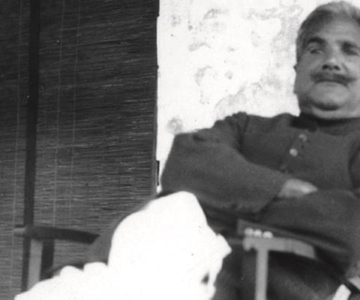I am happy to publish this guest post sent from New Zealand.. (RR)
“Let us honour if we can, the vertical man,
Though we value none but the horizontal one.” – Auden
“Be sorry for the extraordinary man that he had to live in such miserable age that he had to exert himself polemically all the times.” – Goethe
Nietzsche went hopelessly insane at the age of forty five in January 1889 and died as such eleven years later on 25th August 1900 in Weimer. Ironically the king Friedrich Wilhelm IV of Prussia, on whose birthday Nietzsche was born and christened after him, became mad a few years later and so did Nietzsche’s father. Yet this man, Nietzsche, has inspired the greatest minds of twentieth century more than any other thinkers of recent times. Thomas Mann, Herman Hess, Rilke, Andre Gide, Sartre, Camus, G.B.Shaw, W.B.Yeats,O’Neil, Martin Bubber and Freud have all acknowledged their debts to the inspirational vision of Nietzsche. In Mohammad Iqbal’s poetry one can clearly realize the strong influence of Nietzsche’s philosophy before Iqbal’s lapse into politico-religious whirlpool.
Friedrich Nietzsche was born in Rocker, in the Prussian province of Saxony, on 15th October,1844. His father Ludwig Nietzsche was a Lutheran minister.
After his father’s death in 1849, his mother lost her other son in 1850,born in 1848. She moved her family to Naumberg and Nietzsche spent the rest of his childhood – as the only male in a household consisting of his mother, sister, father’s mother and two maiden aunts. In 1861, he wrote an enthusiastic essay on his ‘favourite poet’, Friedrich Holderlin, of who, majority of his people scarcely even know the name. Holderlin had spent last decades of his life in insanity. But sixty years after Nietzsche wrote his essay, Holderlin was widely recognized as Germany’s greatest poet after Goethe. The teacher gave the remarks on Nietzsche’s essay – “I must offer the author the kind advice to stick to a healthier, clearer and more German poet”. Nietzsche wrote in an apocalyptic moment – “Not only the reason of millennia, their insanity too, breaks out in us. Dangerous it is to be an heir.”
He was a professor at the age of twenty-four and taught classical philosophy for ten years, from 1869 to 1879, when he retired because of poor health. Nietzsche’s first book “The Birth of Tragedy” came in 1872.
Rarely is a man born who is too honest to be painful even to himself, who is a chimera that eludes and infuriates the uninitiates and yet brings back the pearls of wisdom from the depths of soul at the risk of being ridiculed and shunned. And all of it was Nietzsche.
He wrote;” With thy love, go into thine isolation, my brother, and with thy creating; and later only will justice limp after thee”. Nietzsche was skeptic about systems. He wrote passionately against them. He wrote, “I am not bigoted enough for a system and not even for my system.” What he objects to is the failure to question one’s own assumptions.” A very popular error: having the courage of one’s convictions; rather it is a matter of having the courage for an attack on one’s convictions”
This, insight of non-ideological consciousness in western thought, is perhaps unique and more near to the ancient wisdom of east, of which he spoke of rather too harshly, sometimes, for want of his exhaustive excursions into them. He realized that systems were good for man who uses them intelligently, but bad for the philosopher who artificially imprisons his thoughts in one of them.
Nietzsche’s prose is lyrical, prophetic and yet sarcastic, even to himself. He was weary of the dull-minded pupils who want to grasp the ‘truth’ with one leap. Lou Salome perhaps came closest to being accepted for the role of pupil. He intentionally created polemic barriers around him so as to discourage the ‘wagon-jumpers’. “Blow amongst these leaves O Zarathustra that everything may run away from thee the faster”
He envisioned a completely free man, a psychologically healthy over-Man whom he called ‘Superman’, a man without crutches. “I am a railing alongside the torrent; whoever is able to grasp me may grasp me! Your crutch, however, I am not….”
It is arduous task to categorize him. He was liberated soul for whom convictions were like prisons. It was the cold and rigid philosophical atmosphere of Europe, which he so abhorred and yet was forced to address himself to.
Nietzsche’s meeting, friendship and final parting of ways from Richard Wagner, the great musical composer, were the most important events of his life. They shared passion for Schopenhauer and music. Wagner was like a father substitute to him, he surely missed, having grown up in a fatherless house alone with five women. In Wagner he saw the possibility of complete man. Cossima, Wagner’s wife, turned protestant and what was then fashionable, anti-Semite. She inspired Wagner to write ‘Parsifal’ – the Christian music drama. Nietzsche, the pagan, was horrified. He never ceased respecting that sincere and ‘genuine Christianity’ which he considered ‘possible in all ages’ but was repelled by its distortions. Wagner, the neo-convert, was gleeful with his Semitic Christian chauvinism, fanatical bigotry and German mania. Nietzsche could not stand all this. He became increasingly aware of the impossibility of serving both Wagner and his call: “Independence of soul- that is at stake here! No0 sacrifice can then be too great: even one’s dearest friend one must be willing to sacrifice for it, though he be most glorious human being……”
Nietzsche said what he thought was the need of the time- to force the thinking man to see the creeping demons beneath what we call civilization. But like all prophets, he failed and cultured man not able to grasp his implication, turned against him.
The madness of the civilization finally bloomed into full-scale psychotic frenzy in the shape of Third Reich and Hitler. It was all against which Nietzsche had cautioned bluntly time and again. He could foresee the ugly and horrifying climax of the philosophical, political and emotional currents of his times. He cried in his writings like a helpless man who understood but could do nothing to stop the gathering momentum of the historical stupidities and viciousness of men. It is a sad irony that in their hurry to gain credibility, the brown-shirts of Hitler embraced and thus sullied Nietzsche beyond imagination. The Nazi scholars like Oehler, Baumler, and hartle distorted his words and used them out of context to propagate anti-Semitism. Nietzsche never spoke in softer terms about Man’s prejudices. He wrote to his sister, Elisabeth, in hearing about her marriage to Bernhard Forester, a prominent leader of anti- Semitic movement: “One of the greatest stupidities you have committed for yourself and for me. Your association with an anti-Semitic chief expresses foreignness to my whole way of life which fills me ever again with ire or melancholy…….. It is a matter of honour to me to be absolutely clear and unequivocal regarding anti-Semitism, namely opposed…..”
In fact it was her sister, Elisabeth Forester Nietzsche, who corroborated in falsifying Nietzsche’s philosophy in her wish to be in the company of fast rising Nazi leadership and many people, for the lack of their own study of Nietzsche, still hold him in contempt. Nietzsche wrote: “He will be mistaken for another and long be considered an ally of powers he abominates.”
‘Thus Spake Zarathushtra’ was the culmination and integration of all Nietzsche believed in. He spent only about ten days on each of the first three parts. The very rapid composition itself, however, was accomplished in a frenzy of inspiration in which he felt as if was a ‘mere mouthpiece’ of the flood, which erupted out of him. Like any mystic vision, it was too illuminating for the foggy-minded culture to look at. He was like a man who had seen and experienced something extraordinary and wanted to share its joys with the rest of humanity. This was the book that was to inspire the coming generations with its profundity, lyrical prose and deeply disturbing psychological implications. Nietzsche knew of people’s propensity to romanticize the past or to project them futilely into future for a utopian dream. He was acutely aware of its frightening consequences as the history later on experienced bitterly in the shape of ‘Third Reich’ of Hitler, nightmarish utopias of communism or our present day religious fundamentalism. He asked the men to believe in themselves and to address themselves to the present so as to solve their dilemmas. He wrote: “With mummies, some fall in love; other with phantoms; both alike hostile to all flesh and blood….. Oh! How repugnant are both to my taste! For I love blood.”
To understand Nietzsche, the disturbing questions he posed, the convictions he held and lived, the liberating vision he had, one must go through his life and his works rather than have a cursory and hurried acquaintance through articles such as this. Such articles should rather be the starting point to an illuminating journey.
Nietzsche’s task must be determined not by looking at his life, devotedly or ironically but by a careful examination of his thoughts.
Nietzsche was a prophet of modern times, afraid of being pronounced holy, a man too sceptic to believe in himself and yet knew his genius and was crushed by it. Nietzsche’s words mirror his coming horrors prophetically and poignantly: “With my tears, go into thine isolation, my brother. I love him who seekth to create beyond himself, and thus succumbeth.”
— Brijinder ‘Sagar’
brijinder11@yahoo.co.nz


